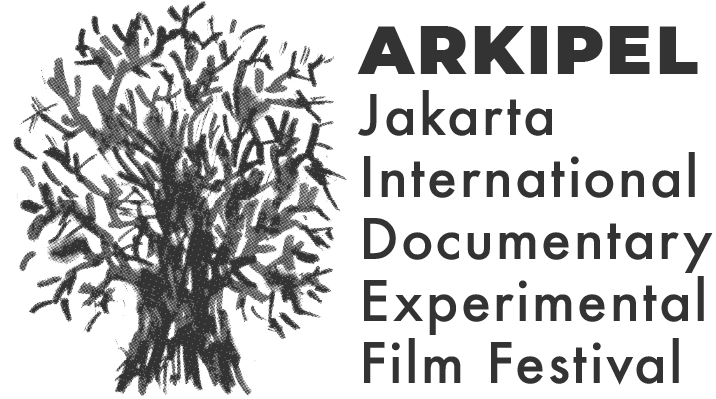Subversi dan Eksperimentasi Masa Lalu: Presentasi Spesial oleh Beijing International Short Film Festival
Pada tanggal 29 November, festival filem ARKIPEL menayangkan filem-filem yang telah dikurasi oleh Ding Dawei, seorang direktur festival dari Beijing International Short Film Festival (BISFF), sebuah festival filem independen tahunan yang diselenggarakan di RRT.
Dalam acara presentasi spesial ini, Dawei telah memilih tujuh filem yang ia anggap mampu menunjukkan bagaimana para generasi baru sineas mampu mensubversi arsip-arsip menjadi hal yang baru dan politis. Kuratorial ini menayangkan total tujuh filem: lima merupakan filem-filem eksperimental dari luar Cina, sedangkan dua filem merupakan karya anggota generasi baru sineas Cina yang memiliki perspektif baru dan unik tentang relasi arsip dan sinema.
Filem-filem yang ditampilkan adalah Lullaby (2020) dari sutradara Pathompon Mont Tesprateep diproduksi di Thailand, The Visitors (2017) dari sutradara Rob Carter diproduksi di Amerika Serikat, Darkly Negative Prints (2022) dari sutradara Frank Fang dan diproduksi di Cina, A Letter From Huami (2020) dari sutradara Wency Zhang dan Huang Yue diproduksi di Cina, No One Cried (2021) dari sutradara Daniel Jacoby diproduksi di Belanda dan Jerman, Personne (2016) dari sutradara Matthias Müller dan Christoph Girardet diproduksi Jerman, dan Imperial Irrigation dari sutradara Lukas Marxt diproduksi di Jerman dan Austria.
Filem Lullaby adalah filem yang sangat menarik karena mampu memaparkan pesan-pesan politik terkait isu-isu masa kini namun dengan gaya tradisi lisan lokal. Selama durasi filem, kita diperlihatkan tangkapan seorang ibu di layar yang nampak sedang menyanyikan ninabobo untuk anaknya. Namun dalam lagunya, sang ibu memberikan petuah-petuah moral yang terkait dengan isu-isu politik, khususnya di kawasan Asia Tenggara saat ini, seperti penyebaran berita bohong dan konflik agama. Pesan politik yang disampaikan lewat lagu ini menjadi sangat politis, namun juga sarat dengan perasaan nostalgia.
Filem The Visitors berusaha untuk menelusuri pergantian pulau Mallorca, Spanyol dari masa ke masa lewat foto-foto lawas. Adegan pertama dalam filem ini membuat saya dan penonton lain penuh dengan tawa dan kekaguman, karena kita melihat sebuah tangkapan pemandangan jalan yang diapit oleh laut dan hutan, namun tidak lama api mulai menjalar. Saya pun sadar yang kita lihat bukanlah sebuah tangkapan video lawas, namun sebuah foto. Selama filem berlangsung, kita melihat bagaimana Mallorca berkembang dari zaman lawas ke modern melalui manipulasi foto arsip yang imajinatif. Menggunakan teknik stop-motion, filem ini mampu membuat kumpulan foto-foto arsip menjadi seperti menjadi gambar kolase yang bergerak.
Darkly Negative Prints adalah sebuah filem dari sutradara Frank Fang, salah satu bagian dari generasi baru sineas di Cina. Filem ini diawali oleh adegan yang puitis: yaitu pembicaraan antara seorang sosok dengan kumpulan ikan di sungai yang meminta makan dengan imbalan sebuah cerita tentang masa lalu di masa depan. Dari adegan surreal tersebut kita berpindah ke Cina masa kini. Namun, Fang tidak menunjukkan kemegahan kota yang modern, tidak. Dia menunjukkan reruntuhan pabrik yang terbengkalai, seakan ada masa sebelum kota tersebut menjadi modern.
A Letter From Huami disutradarai oleh Wency Zhang dan Huang Yue yang juga merupakan sineas muda dari Cina. Berangkat dari sebuah surat yang ditulis oleh seekor kucing bernama Huami untuk pemiliknya yang berada di masa lalu, filem ini menggunakan arsip sebagai sebuah alat naratif untuk mengeksplorasi keterhubungan antara memori masa lalu dan kesadaran manusia. Walau cukup rumit, filem ini mampu membangkitkan emosi saya tentang masa lalu dan posisi memori dalam benak saya sendiri.
No One Cried menggunakan arsip dari tangkapan layar ruangan-ruangan yang digunakan dalam sex room virtual, sebuah tempat di mana seseorang bisa membayar untuk mendapatkan pornografi secara langsung. Filem ini menurut saya mengangkat sebuah isu yang sangat penting dalam era digital, yaitu relasi antara dunia digital yang mengutamakan anonimitas, dan tanggung jawab moral individu yang kini menjadi anonim. Isu ini secara eksplisit muncul dalam dialog antara seorang pria dan perempuan yang berdiskusi tentang serial TV di HBO, dan permainan video yang menghadapkan manusia kepada karakter virtual. Moralitas dan etika yang mereka punya dalam kehidupan sehari-hari mampu menghilang dalam kemayaan dunia digital.
Personne berpusat pada rekaman filem-filem dari aktor legenda Perancis Jean-Louis Trintignant yang diselingi oleh selipan-selipan dari rekaman filem-filem Hollywood yang dibintangi Gregory Peck dan Jane Fonda. Walau tidak dapat menangkap intensi filem ini ketika menonton, penggunaan arsip filem-filem ini yang dimanipulasi dengan teknik penyuntingan yang menciptakan visual yang mengasyikkan dan cepat, namun tidak cerewet atau ngalor-ngidul. Ini membuat saya terpaku pada layar sepanjang film.
Filem terakhir, Imperial Irrigation, memeriksa relasi antara industri militer Amerika dan kehancuran laut Salton di California. Dalam filem ini, sutradara Lukas Marxt menelusuri bagaimana industri militer di Amerika Serikat berperan aktif dalam menghancurkan ekosistem di Laut Salton yang dulu juga dipakai sebagai tempat tes senjata pada Perang Dunia II. Filem ini menggunakan arsip dan teks historiografi yang dinarasikan sepanjang filem untuk melihat bagaimana hasrat imperialisme Amerika Serikat juga turut menghancurkan ekosistem lokalnya sendiri untuk mengembangkan senjata pemusnah massal.
Filem-filem ini bagi saya pribadi menunjukkan bagaimana arsip yang selama ini hanya digunakan sebagai penunjang visual dalam sinema menjadi visual utama dan membuat arsip-arsip tersebut yang seakan netral menjadi politis.
The Subversion And Experimentation of The Past: Special Presentation by Beijing International Short Film Festival
On 29 November, the ARKIPEL film festival screened some films curated by Ding Dawei, the festival director of the Beijing International Short Film Festival (BISFF), an annual independent film festival in China.
In this special presentation, Dawei had chosen 7 films that he thought can show how the new generation of filmmakers can subvert the archives into something new and political. This curatorial has a total of 7 films: 5 are experimental films from outside China, and the other two are created by members of the new generation of Chinese filmmaker with a new and unique perspective regarding the relationship between archive and cinema
These films are Lullaby (2020) from director Pathompon Mont Tesprateep produced in Thailand, The Visitors (2017) from director Rob Carter produced in the USA, Darkly Negative Prints (2022) from director Frank Fang produced in China, A Letter From Huami (2020) from director Wency Zhang dan Huang Yue produced in China, No One Cried (2021) from director Daniel Jacoby produced in Belanda dan Jerman, Personne (2016) ) from director Matthias Müller dan Christoph Girardet produced in Germany, dan Imperial Irrigation (2020) from director Lukas Marxt produced in Germany dan Austria.
The film Lullaby is very interesting to me because it can combine its political message that is relevant today with the local oral tradition style. During the course of the film, we saw a shot of a mother who seemed like singing a lullaby to put her child to sleep. But in her song, the mother speaks of moral advice relating to today’s political issues, especially in South East Asia, like the spread of fake news and conflict between religions. The political message that is communicated by the song makes this song very political, but also nostalgic
The Visitors tries to trace the change in the island of Mallorca, Spain from time to time through old pictures. The first scene of this film triggered some laughter and admiration among the audiences (me included) upon seeing a shot of a road between the sea and forest but before long, a fire burnt the pictures. This is where I realized that this shot is not a video, but a photo. During its course, this film shows us how Mallorca evolved from the old times to modern times through an imaginative manipulation of the photo archive. Using the stop-motion technique, this film can make these archival pictures into moving collages of images.
Darkly Negative Prints is a film by director Frank Fang, who is a part of a new generation of filmmakers in China. This film opens with a poetic scene: the conversation between an individual and a school of fish in the river that demand food in exchange for the story of the past and future. From this surreal scene, we are transferred to China today. Fang is not showing us the big and modern city, no. He showed us the ruins of the factory as if to show us that there was a period before the city turned modern.
A Letter From Huami is directed by Wency Zhang and Huang Yue who are also young filmmakers from China. Starting from a letter written by a cat named Huami to its owner in the past, this film used the archive as a narrative tool to explore the relationship between memory and consciousness. Although slightly complicated, this film is capable of evoking my emotion about the past and the position of memory in my own mind.
No One Cried used the archive from the screen capture of rooms that are used to do virtual sex rooms, a place where people can pay to get live pornography. For me, this film raises an important issue in the digital era: the relationship between the anonymous digital world, and the moral responsibility of the individual who has become anonymous. This issue is explicitly shown in the dialogue between a man and woman discussing the TV series on HBO and a video game that faces humans with a virtual character. The morality and ethics that they have in real life can disappear in the virtuality of the digital world
Personne centers around the footages of legendary French actor Jean-Louis Trintignant, mixed with inserts from the footages of films starred by Gregory Peck and Jane Fonda. Although I cannot grasp the intention when watching this film, the usage of these film archives that are manipulated by editing that creates exciting and fast visuals, but not fussy nor babbling. It keeps my eyes glued to the screen throughout the film.
The last film, Imperial Irrigation, examined the relationship between the industrial military complex in the USA with the destruction of the Salton Sea in California. In this film the director, Lukas Marxt searches how the US military-industrial complex plays an active role in the destruction of the Salton sea ecosystem that is also used to be a testing site for a weapon in World War II. This film use archive and historiographical text that is narrated throughout the film to see how the US’ imperialist desire also destroy its local ecosystem for the development of a weapon of mass destruction
For me, these films show how archives, that mostly are used as mere visual support in cinema, can be brought to the center, and in turn make those seemingly neutral archives become political





